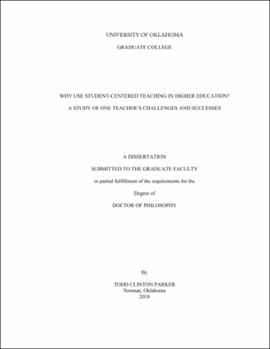| dc.description.abstract | Modern educational practices have fostered relationships that place instructors and teachers as the experts or central authorities regarding academic knowledge, academic disciplines, and teacher-student relationships, relegating students to the relatively inferior or disempowered position of novices while placing teachers, particularly college and university instructors, in more institutionally powerful positions as “scholar academics.” Alternatives to top-down objectivist and scholar academic approaches such as student-centered and subject-centered learning have been shown to facilitate engaged, critical, and comprehensive learning. However, despite data that support using student-centered learning in higher education, many teachers are still disposed to using scholar academic or objectivist approaches commonly observed in higher education. Why do some teachers in higher education choose to use student-centered teaching approaches while others do not? The aim of this study was to better understand the perspectives of a university professor who chose to employ student-centered learning approaches in her college classroom. A qualitative case study methodology with an interpretivist or constructivist/social constructivist epistemological orientation was used for this study. Methods of data collection included classroom observations, semi-structured interviews with the college professor, and analysis of curricular documents.
Based on the data gathered in this study, it appears that the college teacher experienced at least three major challenges to using student-centered learning approaches. These included her higher education learning environment, student views about higher education, and personal factors such as the amount of time and energy needed to successfully facilitate student-centered learning teaching approaches. However, three major groups of benefits were also identified, including benefits for her students, benefits for herself as a teacher, and benefits for society. In light of these findings, it is suggested that college teachers should consider orienting their courses to more student-centered learning approaches. However, since many obstacles remain, it is essential for those who wish to utilize student-centered teaching approaches to develop communities from which support can manifest and actively seek others who are already using such approaches. | en_US |
